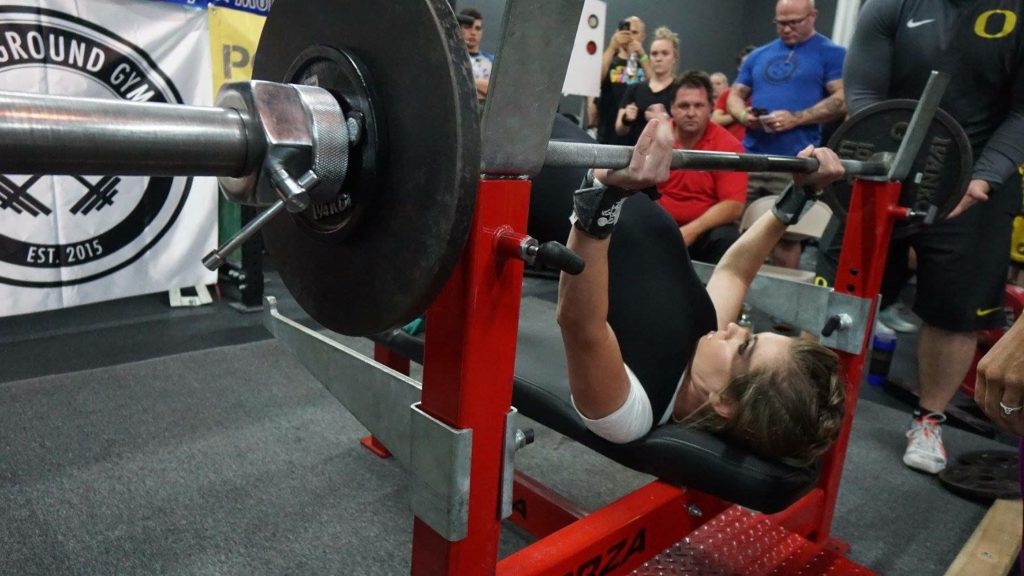FitBliss coach Natalie Suaz is determined to provide a sane alternative to the crash dieting and extreme overtraining popular in the fitness industry. Her years of experience in gymnastics, bikini competition and powerlifting have convinced her that women need a viable alternative to the unhealthy methods in mainstream weight-loss culture. Read how she’s helping women find their strength!
You’ve been working in the health industry since 2008; how long have you been coaching?
I’ve been coaching off and on for the last five years. I’ve maintained my close group of clients, but I’ve been reluctant to invest 100% of my time in the coaching business.
After a few life changing experiences— losing my mom, having children, etc. it put things in perspective. Life is short. And I should follow my dreams and do what makes me happiest. And helping women find strength, look beautiful and lift some heavy stuff in the process is my passion. So I finally took the plunge to coach full time and joined the Fitbliss coaching staff this past year— I’ve never been happier!
You’ve been rehabbing from an injury for most of this year. What happened?
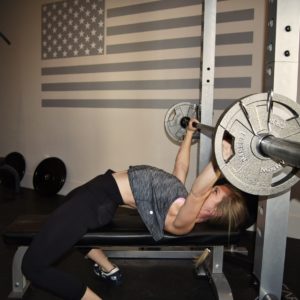 December 2016 I was training pretty hard for a meet. There was a combination of a few things that led to my injury. I was battling a four week cold, lack of sleep because my daughter wasn’t sleeping through the night yet, I was traveling quite a bit because we were building our home across the state. I overtrained. I wasn’t recovering properly. I had stopped working on mobility. All things I knew I needed to do, but I had never had an injury and thought I was super mom at the time. I ended up herniating three discs and my SI joint dysfunction set in for the first time (something all new moms should be concerned about after pregnancies). Long story short, I couldn’t push a shopping cart for three months – let alone start lifting until May 2017. Next to my mom’s passing, it was the hardest time of my life.
December 2016 I was training pretty hard for a meet. There was a combination of a few things that led to my injury. I was battling a four week cold, lack of sleep because my daughter wasn’t sleeping through the night yet, I was traveling quite a bit because we were building our home across the state. I overtrained. I wasn’t recovering properly. I had stopped working on mobility. All things I knew I needed to do, but I had never had an injury and thought I was super mom at the time. I ended up herniating three discs and my SI joint dysfunction set in for the first time (something all new moms should be concerned about after pregnancies). Long story short, I couldn’t push a shopping cart for three months – let alone start lifting until May 2017. Next to my mom’s passing, it was the hardest time of my life.
That’s a lot in a short time! How has the rehab process made you a better coach?
I learned a lot about myself, about prehab and rehabbing. I went to rehab every day and spent every waking minute researching and trying different techniques to get better. I know there are so many people out there that can’t afford or don’t have access to physical therapy. I know how painful, both physically and emotionally, injuries can be and that’s why I put so much information on my social media. It’s also why I take a more careful approach with training. All my clients go through movement assessments and are required to perform mobility, stability and certain strengthening exercises to avoid injury.
Your fitness history started when you picked up a dumbbell at age six. Did your parents have a home gym?
I wish! I was actually a competitive gymnast and part of our conditioning was resistance training. And not just curls, we did barbell work too. I specially remember doing snatches, clean and jerks and squats. I look back now and think how awesome that our coaches started us so young.
Your gymnastics experience aside you’ve suffered the effects of bad coaching. What was it about FitBliss that attracted you to the group when you’d already had a bad coaching experience?
I came to Fitbliss after I recovered from a lengthy illness that was brought about from overtraining and extreme dieting. I was only looking for a program that had priorities and values in line: health, strength, compassion. Turns out I hit the jackpot! FitBliss combines powerlifting, increasing strength and maintaining lean mass, while putting health first. After my first consult I only wish that I had found Fitbliss sooner!
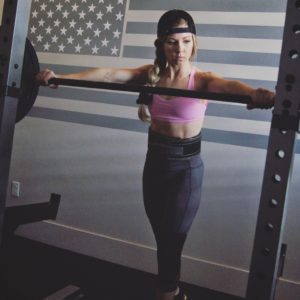 Most of the programs that target women in the at home fitness industry focus on fat loss and fun; Fit Bliss is one of a few that starts with overall health.
Most of the programs that target women in the at home fitness industry focus on fat loss and fun; Fit Bliss is one of a few that starts with overall health.
No one likes to talk about the bad experiences that women have in the fitness industry. But it’s very common. From binging, to an unhealthy relationship with food or a full blown eating disorder, you’d be surprised how frequently it comes up in some shape or form. Fitbliss is unique as we recognized the need for such support. We are a group that prioritizes health. And since so many “experts” are handing out cookie cutter programs and then sending them on their way, who is there to pick up the pieces when a crash diet stops working? We will be there.
How did that become the foundation?
Unfortunately bad experiences are what brought this on, but Fitbliss has made it a priority to change the industry. We strive for health and weight loss that is sustainable, and of course we have fun in the process.
Describe your training philosophy.
First and foremost, health should be a top priority. If a client’s goal is to lose weight, health should never be put in jeopardy to get where they want to be. It may take longer than an extreme diet, but we all know that a huge deficit is not sustainable, is detrimental to one’s health and will likely lead to weight gain in the long run. If a client’s goal is to gain strength for performance, like powerlifting, safety and technique are in the spotlight. Injuries are common in any sport, but I take extra care to focus on prehab, mobility and corrective work to minimize risk. Again, it may take longer to break records, but having an unrealistic powerlifting goal is a recipe for injury. And whatever a client’s goal may be, we also focus on emotional and mental health to achieve long term changes and not just a quick fix.
As you say it’s not a quick fix so how do you handle it when a client complains that she’s not getting the fast results promised by Program X on late night television infomercials or they see other competitors seem to constantly hit PRs on the platform while you have them prehabbing?
I try to educate my clients that fad diets and quick fix results are usually not accurate nor something sustainable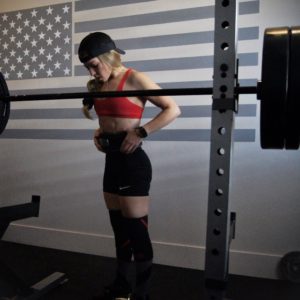 long term. By teaching clients the whys instead of the what’s to do, they can take the tools I teach them about flexible dieting, gaining lean muscle and use them for the rest of their lives, rather than the “30 days to lose 30 pound” diet or whatever.
long term. By teaching clients the whys instead of the what’s to do, they can take the tools I teach them about flexible dieting, gaining lean muscle and use them for the rest of their lives, rather than the “30 days to lose 30 pound” diet or whatever.
As an online coach, you don’t get to actually meet your prospective clients; to pick up on the nonverbal cues that let you get a feel for what makes a client tick? How do you build rapport with your distance clients?
I try to be as personal with clients as I can. Prior to signing up, we first connect over Skype so I can have an in-depth, personable conversation with them to connect on goals, understand their personality and give me a better idea of what they are after. We are lucky to live in a world today where communication can be done at anytime, anywhere. As with almost every service today, I can stay very connected to my clients (I do this through detailed check-ins, videos, text). I feel like I know each client just as well, if not better than if we met on a regular basis. I keep my phone available because it’s important to me that we communicate effectively and that we build a level of trust.
No one can serve every market. Describe your clientele: what’s demographic do you find is the best fit for your services?
Our services are geared toward women who want to lift weights, look good feel good in the process. However, we definitely specialize in powerlifters and bikini competitors. It’s a unique hybrid that you don’t find often, but is fun and rewarding to prove it’s possible. For a long time it was thought that bikini girls should lift lighter weights, do a ton of reps and lots of cardio. When in fact, you can still lift heavy and achieve a bikini competitor look.
Fit Bliss isn’t necessarily a household word. So when your clients find you are you typically their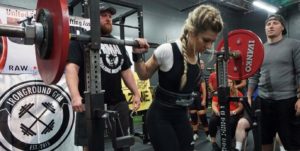 first experience with a coach or do they come to you after already trying online coaching with others?
first experience with a coach or do they come to you after already trying online coaching with others?
It’s a mixture of both. There are always clients who come to us because of a bad experience with someone else (like myself). These are my favorite success stories, because so many of us can relate.
And there are also new clients who come to us, check out our website and decide they love to hear what we are all about. I don’t know of any ladies fitness group where a client can train for a bikini competition, powerlift through prep or a pregnancy, maintain flexible dieting and also rely on our on staff licensed therapist. It really is a unique, refreshing experience that we provide.
Having clients come to your home requires a certain level of trust. For every twenty-five perfectly normal people you have that one person who’s like Bridget Fonda’s roommate in Single White Female. How do you screen out the crazy?
You’re right. There are some crazy people out there. Right now I only allow clients that I know personally or have trained for a while to work out in my home. I also make sure to have my husband home, because you never know. I don’t take many one on one clients, as the majority of coaching can be done effectively through video demonstrations and two-way feedback. I encourage my clients to try it out, and they are pleased with how convenient the process is.
You personally compete in powerlifting and like many women who discover the sport, have praised it for the feeling of empowerment as you are judged not for your appearance but for your ability on the platform. Do you use the powerlifts as a basis for your training and do you encourage your clients to find a competitive outlet of some kind?
Powerlifting is the basis of my personal training, and although it’s rewarding for most, I know it’s not for everyone. If someone is ready to incorporate bench, deadlifting and squatting in their training, I will always ask if they are open to the main lifts (or progressive variations) in their training. Compound movements effectively build muscle and can increase strength quickly.
And yes, many ladies approach me with wanting to get stronger and leaner, and if they don’t have a meet or show in mind, I strongly encourage them to set a realistic, rewarding goal. This could be anything from getting in shape for a wedding, achieving their bikini body for summer, or even preparing for a pregnancy.
You come from a background that includes participating in several sports known for strict weight standards. Do you find that experience helpful in redirecting your clients who come to you focused on fitting in that dress for a high school reunion or a friend’s wedding?
I can definitely relate with the feeling of wanting to look a certain way. Gymnastics, cheerleading, bikini competitions all have that certain “look”. I do think it helps me communicate with clients because I know exactly where they are coming from, and why they might be frustrated with something like the scale. My job is to help them understand that it’s not necessarily about losing weight, but instead increasing lean body mass while losing fat.
FitBliss Therapy
How do you determine whether a client needs to take advantage of FitBliss Therapy or whether FitBliss online coaching is enough?
I believe anyone can benefit from therapy. That being said, if someone regularly brings up body image issues or displays signs of an unhealthy relationship with food, I will always recommend that the service is there. If it is obvious that someone has an eating disorder, then it’s a more personal conversation that I’ll have with my client. Knowing that all Fitbliss coaches will put health first, our clients know that we want what is best for them. All information is kept confidential.
Emotional states play a huge role in women’s fitness. Men struggle with self denial; as long as our arms are tight in our shirt sleeves and we can wear baggy shirts we can rationalize our weight gain. With women it seems that recognizing that they are out of shape can actually cause depression which in turn leads to more weight gain and destructive behavior. What do you do when you recognize that a client is beginning a downward spiral, especially when you’re not there in person to provide emotional support?
Emotional states play a huge role in women’s fitness. Men struggle with self denial; as long as our arms are tight in our shirt sleeves and we can wear baggy shirts we can rationalize our weight gain. With women it seems that recognizing that they are out of shape can actually cause depression which in turn leads to more weight gain and destructive behavior. What do you do when you recognize that a client is beginning a downward spiral, especially when you’re not there in person to provide emotional support?
How does the therapy session support the online fitness coaching and vice versa?
Therapy, training and nutrition will go hand in hand. First and foremost, confidentiality is taken seriously and therapy sessions are not discussed with coaches. However, as a coach we do our best to maintain proper nutrition (micros, etc), water intake and sufficient sleep to help make sure hormones, mood and performance are as in line as much as possible. Training will be adjusted to support whatever life event our client is experiencing. We also offer emotional support and encouragement during weekly check ins.

